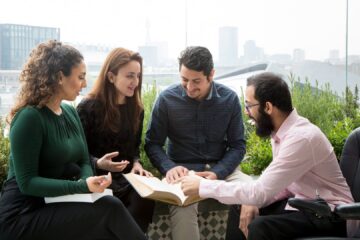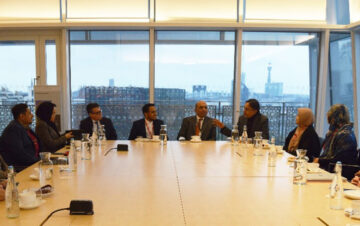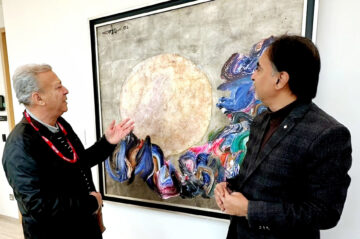Among the critical challenges that the human race and the planet face today perhaps none is as urgent as the global climate crisis along with environmental degradation. Scholars, policy makers, governmental and non-governmental agencies, along with a myriad number of civic groups, are all focused on dealing with different aspects of the challenge. While the literature on how religious traditions have grappled with ideas of environmental dominance, as well as the interdependence of humans and the environment over the past many millennia is robust and growing, a little-explored area is how IsmailisAdherents of a branch of Shi’i Islam that considers Ismail, the eldest son of the Shi’i Imam Jaʿfar al-Ṣādiq (d. 765), as his successor. in the past and present have engaged with the environment and issues surrounding climate change.
It is now widely recognised that human activity is one of the key drivers of climate change and environmental degradation. There is, however, a research gap on the intersection between religious conceptualisations of the universe and a myriad of facets of the created world. To bridge this gap, The Institute of Ismaili Studies (IIS) is convening an inaugural conference to critically examine the Ismaili intellectual heritage, its philosophical, literary, poetic and artistic expressions, as well as accounts of lived experiences from diverse historical and contemporary contexts to generate pivotal research using the lens of elements—earth, water, air, fire, and ether. The conference seeks to provide a platform for generative discussions on how these elements have been viewed in their multiple imaginations, articulations and discussions in varied expressions of ideas within the Ismaili and connected traditions. Such considerations might extend to situating them within environmental and ethical frameworks informed by broader Muslim, humanistic and civilisational traditions.
The conference invites scholars and researchers working in a wide array of fields and periods related to the study of Ismaili traditions in their diverse expressions, and employing the disciplinary lenses of their specialisation, to engage with discursive, poetical and literary sources, contemporary literature, stories and folklore, as well as action-oriented endeavours to explore any of the following thematic areas:
- The symbolic and natural representation of any of these elements in the Qur’an(also Koran. Arabic term meaning, ‘recitation’ or ‘scripture’): Muslims believe that the Holy Qur’an contains divine revelations to the Prophet Muhammed received in Mecca and Medina over a period of… More;
- Ismaili literary and poetical traditions and their depiction and wisdom related to the elements in relation to such issues as creation, redemption, human dominance and/or independence vis-à-vis the environment and habitat;
- Understanding different facets of nature and their interconnectedness with elements and their different articulations, whether symbolic, metaphoric or natural;
- Intersections of science, philosophy and elements within the intellectual traditions of the Ismailis;
- Contemporary literature, including folk stories and folk music, that explores the impact of climate change and environmental degradation in relation to the elements and the ideas proposed and steps taken to remediate the challenge;
- Critical framings of climate change and environmental degradation, including but not limited to such topical concerns as decolonising environmental discourse, gendered dimensions of climate injustice and global climate policies and politics;
- Pedagogical and educational approaches to addressing climate change and environmental degradation with particular reference to the aforementioned elements using the lens of religion as articulated in Ismaili discursive, devotional, and lived practices within the larger context of Muslim and human civilisational aspirations.
The conference hopes to generate discussion on a number of broader and interrelated issues, such as:
- How do religion and environment interact in academic scholarship and in practice?
- What does this interaction tell us about how religion and, more specifically, religious texts are employed to respond to contemporary challenges?
- How can such examinations of key elements at the heart of the natural order allow us to create a meaningful dialogue between religion, environmental sustainability and contemporary challenges?
- What can religious traditions learn from local, folk traditions about attitudes to these elements in different forms, e.g., water bodies, glaciers, mountains, trees, plants etc.?
- Are there distinctly ‘Ismaili’ modalities of engaging with embodiment and the natural world that emerge from an examination of such discourses and practices? If so, in what ways?
- Do Ismaili resources on these “elementals” open up possibilities for how we might respond to climate change and environmental degradation?
This conference represents a foundational step for the IIS in establishing a dedicated conversation on environmental research and praxis by generating research on Ismaili conceptualisations of the elements, as well as contributions to environment-related discourses and practices. Through an examination of the discursive, artistic, cultural and institutional engagement with the elements, the conference seeks to foster meaningful dialogue and to inspire actionable insights and a sense of hope into how we might carry out our collective environmental responsibilities.
For without water there is no life
Without air there is no breath
Without fire there is no warmth
Without earth there is no sustenance
Without ether there is no health
Submission of Abstracts and Timelines
Please send your abstract (max. 300 words), accompanied by a short biography (max. 200 words), as a single MS Word file to Samantha Chambers at SChambers@iis.ac.uk.
The deadline for abstracts is 2nd June 2025. A decision regarding accepted papers will be made by mid-September 2025 and communicated to the selected participants.
The conference will be held at the Aga KhanA title granted by the Shah of Persia to the then Ismaili Imam in 1818 and inherited by each of his successors to the Imamate. Centre, London, and limited funds may be available for presenters’ travel expenses and accommodation. Online participation will be made possible for presenters who are unable to travel.
Scholars at all career stages are encouraged to apply.
Conference information
Dates: 19-20 March 2026
Location: The Aga Khan Centre, 10 Handyside Street, London N1C 4DN, United Kingdom
Please note that filming and photography may take place during the conference, and be used across our website, newsletters and social media accounts. These could include broad shots of the audience and lecture theatre, speakers during the talk, and of audience members participating in Q&A.
Views expressed in the conference are those of the presenting scholars, not of IIS, the Ismaili community or leadership. Acceptance of conference papers is not an explicit endorsement of the ideas presented.







